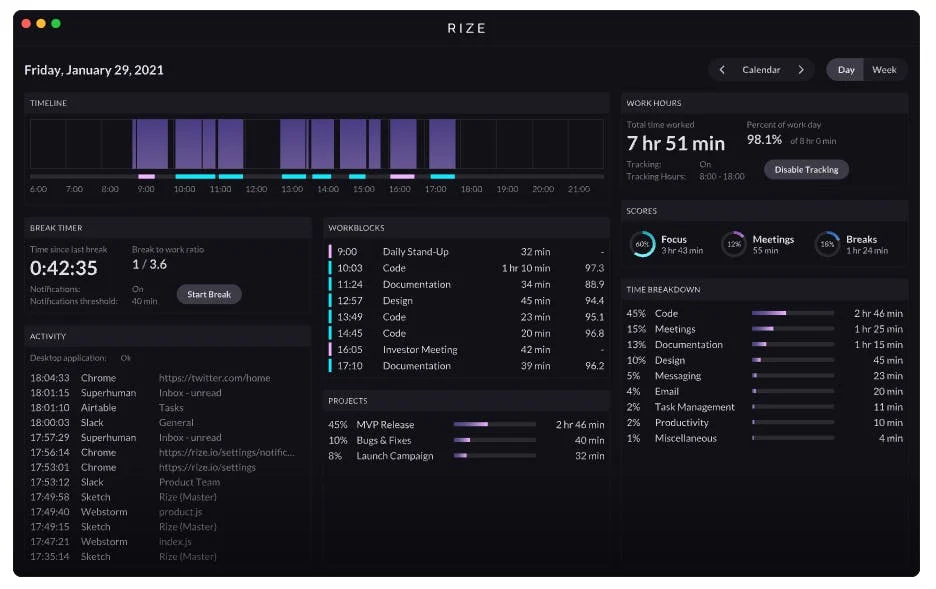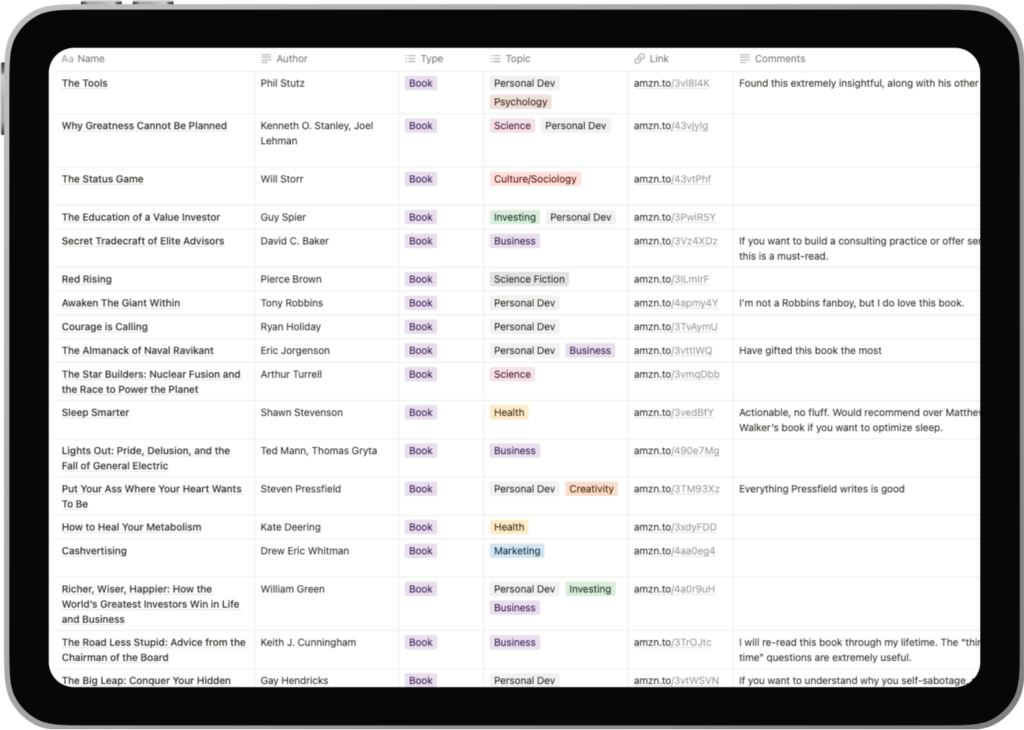Welcome back to the newsletter. Hope you’ve had a great week.
In today’s issue:
- The power of “Just In Time” productivity (if you procrastinate with productivity tools/software stacks all the time, this is for you).
- The Full Stack mentality (being “hard to kill” in life and business)
- Applying blue collar work ethic in the creator/knowledge economy, and why it can be an extreme competitive advantage especially when starting out.
- Other fun stuff (quick links/what I consumed last week, etc)
Let’s get to it.
This week’s newsletter is brought to you by Rize.
Rize is a smart time tracker that improves your focus and helps you build better work habits. I’ve been using it for the past month to track all my work hours, and it’s been a game-changer for my productivity.

As a reader of my newsletter, you can get 25% off the first 3 months with promo code SAMMATLA at checkout.
Just-In-Time Productivity
When Lincoln said, “Give me six hours to chop down a tree and I will spend the first four sharpening the axe.”
He was not talking about wasting hours/weeks/months of your life setting up and optimizing the perfect productivity software stack.
Unless you’re working on high stakes projects that require an immense amount of upfront analysis, planning, and engineering (like building an 8-lane bridge)… you really don’t need that much prep. You don’t need that much “optimization.”
Instead, adopt Just-In-Time productivity: optimize based on real problems and bottlenecks, not perceived future problems and bottlenecks.
Start executing on your goals and projects with a minimal software stack. Use simple, native tools. Pen and paper. Apple notes. Google calendar.
These simple, native tools are not blunt axes. They are more than enough for you to do the work you need to do.
If and when you encounter a problem or bottleneck, implement a better solution.
For example, you might be scheduling dozens of calls/meetings every week. This back and forth scheduling takes up some time. You come across a calendar app like Cron which streamlines the scheduling process. You implement it and see the productivity gains immediately.
But you don’t do what I did once and download a calendar app like Cron thinking, “Well, if I ever end up scheduling a lot of calls at some point in the future, this will come in handy.” And then I wasted 1-2 hours of my day just playing around with it.
I’ve fully adopted this mode of operating now. I tilt myself as much as I can towards pure execution, and actively avoid “organizing/optimizing” until it becomes a real pain point.
- I don’t organize my notes in Obsidian or Apple Notes as I go. I just do it once every few weeks when it feels messy. Organizing as-you-go pulls you out of creative flow and is a form of non-execution. I know there are exceptions to this: some people cannot operate without being organized to some degree. But the majority of people over-organize in this regard.
- Ever since I published my semi-viral vid, Stop Procrastinating with PKM Apps, I haven’t even entertained the idea of switching my productivity stack. The only addition I’ve made is using Rize to track my time.
- I know that my urge to seek out a “better solution” is a form of procrastination and silver bullet seeking. It usually comes when I’m avoiding work I know I need to do, or I’m stuck with a problem. I know that when I feel this urge, a new tool isn’t going to help me. Putting my head down and pushing through will help me.
Try it out.
The Full Stack Mentality
I was talking to a friend last week about my training regimen (lifting, lots of zone 2 cardio, BJJ).
He asked, “What’s your goal with all this?”
My response: “Being hard to kill.”
I mean that semi-literally. I want to be strong, fast, enduring, and able to fight. Another way to put it is that I want to be well-rounded, and competent in multiple domains.
I’ll never be an elite powerlifter. I’ll never be an elite marathoner. I’ll never be an elite competitive martial artist.
But getting to the top 5% of these fields combined is elite in itself.
As KB says in Tactical Barbell:
Being superior in multiple fitness domains is elite… It takes an organized, strategic, disciplined, and focused mind to achieve superior ratings in multiple physical qualities simultaneously. Not just ‘good’, but ‘superior’.
This mentality can be applied to more than just fitness.
As an entrepreneur, I’d much rather be full stack than extremely elite and specialized in one area. I want to be multidisciplinary. Agile. Able to see things from different perspectives and make informed decisions. Able to view the business as a collection of diverse systems rather than having the tunnel-vision of a specialist.
As a person, relationally to others, I want to be full stack. Able to empathize with someone in need just as well as I can calmly defend a point in a heated debate.
Blue collar work ethic in the creator/knowledge economy
While the 40-hour work week is somewhat of a hangover from the industrial revolution and a factory-centric work style, I do think there’s a danger in heading too far towards the “2 hour work day” idea that Twitter/solopreneur gurus are spreading.
Two points I want to make here.
First, volume matters. Most people who are working a 2-hour work day today did not get there by working 2 hours every day.
You can do 2-hour work days when you’ve built up leverage, intuition, and a great skillset. And when you have clarity on exactly what it is you need to do.
But if you don’t have that, then there’s massive ROI in simply putting in more time than the next person. People don’t like to hear this, but it’s true.
I wrote ~200 articles on the internet before I made my first dollar. It was an extremely inefficient and stupid way to build an online business. I made many mistakes. But the lessons I learned from maxing volume of work have served me well.
The second point is that it’s not just the volume/time that matters, it’s your mentality.
There’s too much obsession over ideas and tactics in the creator/knowledge economy.
“What’s the best tactic for building a newsletter?”
“Should I grow my Instagram account, or just focus on Twitter?”
“How can I grow on YouTube?”
When you have the tactic-seeking mindset, you’re naturally looking for shortcuts. All the time.
But the blue-collar mentality suggests that you should put in the damn work before seeking tactics.
Best tactic for building a newsletter? You’ve put out two issues. Just keep putting in the work. Keep showing up.
Should you grow your Instagram account or just focus on Twitter? Yes. Both.
How can you grow on YouTube? Start by publishing videos consistently.
Do the “manual labour” as Jeff Goins says:
Writing is manual labor. It’s good old-fashioned blue-collar work. You sit down and write until you’re done. You show up in your coveralls, punch the clock, and stand at the assembly line, doing your work until the whistle blows.
Other fun stuff
- I’ve been quiet on this one, but my friend Sonny Byrd and I have started a podcast. We’re up to episode 6 and starting to find our groove. No guarantees that you’ll like it. In the latest episode we discuss the pros and cons of solopreneurship, and how the best podcasts are structured. You can check it out on Spotify, Apple Podcasts, and YouTube.
- I’m re-reading Anna Lembke’s Dopamine Nation. Great book.
- Tim Ferriss’s tweet on setting unrealistic goals is a fantastic reminder. I’ve saved it to my notes and am revisiting it frequently. It confirms the importance of setting high-velocity goals, as I talked about in my video on the Triad of Hyperproductivity (inspired by Frank Slootman’s Amp It Up)
Hope you enjoyed this issue! See you next week.
-Sam

